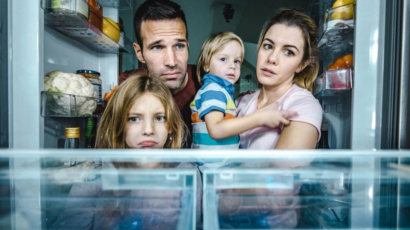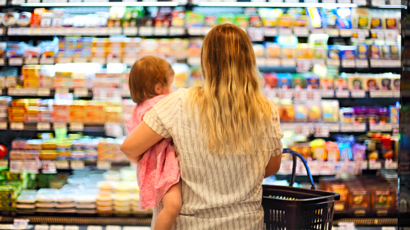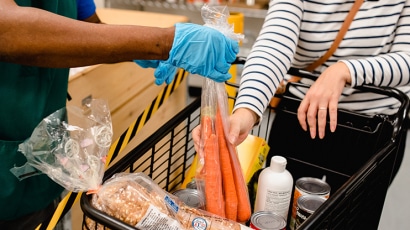Centraide grows generosity
Over the past fifty years, Greater Montreal has been the seedbed for different food security innovations—such as collective kitchens, collective gardens, and community restaurants—that have made their way across the province. In fact, food security has evolved tremendously into solutions that go beyond food donations.
At the centre of this transformation, Centraide has played a crucial role as a strong partner for community agencies by activating change and fostering collaboration. Today, it has become one of Greater Montreal’s largest funders in food security.
Read this retrospective to find out how Centraide has shaped this history and cultivated a sense of community to transcend generations and nurture hope for decades to come.
From food donations to local food systems
Go back to the start to see how Centraide’s vision for food security and support for the community agencies in its network has developed over time.
The
1970s

Since its founding in 1974, Centraide of Greater Montreal has supported agencies whose mission is to provide food and material goods to people in a situation of poverty and social exclusion.
The
1980s

In the 1990s, it expanded its mission to become the region’s food bank and adopted the name Centre de bénévolat et Moisson Laval.
In this decade, the number of emergency food agencies that increased on the Island of Montreal revealed the full scope of the hunger problem.
In 1984, Moisson Montréal, the first regional food bank, was created to coordinate the collection, sorting and distribution of food to local community agencies. Moisson Laval (Centre de bénévolat and Moisson Laval) and Moisson Rive-Sud were founded ten years later.
The
1990s

This agency was one of the new food safety resources added to Centraide’s network at the end of the 1990s.
The agencies helped by Centraide showed a desire to develop alternatives to emergency food assistance and promote initiatives—such as collective kitchens, collective gardens, and community restaurants—to help people become food self-sufficient.
Between 1995 and 2000, Centraide welcomed ten new food security agencies and projectsinto its network.
The
2000s

Founded in 1986 to provide temporary emergency food support, the Food Depot is the perfect example of an agency that over the years has begun to offer a variety of community gardens, kitchens and other programs to promote food self-sufficiency.
In the early 2000s, Centraide invested $1.4 million annually in food security in about twenty community agencies and projects and about a hundred programs and activities.
Meeting food needs is a constant challenge, which is why Centraide had to take stock of its contribution and update and refine its action strategy in this area.
In April 2000, Centraide published its first food-security orientations on beyond food aid: supporting self-sufficiency.

These orientations are based on a deep conviction that:
- To effectively contribute to food security, we need to go beyond solely giving people food and instead help them and their communities find self-sufficient ways to eat healthy, balanced diets.

To achieve this, Centraide:
- Works on the causes of food insecurity.
- Develops and implements sustainable solutions to the problem of food insecurity.
The
2010s

These gardens are the cornerstone of the local food system set up in Saint-Michel in the 2010s.
In this decade, access to fresh, affordable food became a growing concern in many Greater Montreal neighbourhoods. In response, these neighbourhoods started taking action to develop and implement comprehensive local food systems that touched on production, processing, distribution, access, consumption, and waste disposal. They also began integrating multiple components, such as urban agriculture, neighbourhood markets, community grocery stores, and collective kitchens. These systems aim to meet the needs of people living in poverty while also adhering to sustainable development principles.
The
2020s

Regroupement Partage is an agency that has stood out through its flexibility to make changes and meet increased needs.
The COVID-19 pandemic and resulting inflation have put unprecedented strain on people living in poverty and in turn on community agencies. Food insecurity has spiked, and requests for aid have increased. Greater Montreal is the Quebec region most affected by this situation as it is home to the most people living in poverty.
In March 2020, Centraide created the $8-million COVID-19 Emergency Fund to help community agencies implement exceptional measures, particularly to meet emergency food needs.
In light of soaring housing and grocery costs in winter 2023, Centraide announced an additional investment of $1.7 million for 36 agencies in its network. This emergency investment was on top of the $7.1 million already allocated annually to about 70 agencies.
In fall 2023, Food Banks of Quebec announced some unprecedented statistics: every month, 450,000 people in Greater Montreal use food banks. This represents an increase of 50% over the previous year.
Centraide: A key partner in food security innovations
Read a quick history of each innovation and learn how Centraide has always driven action to encourage, support and inspire creative solutions to make sure that thousands of individuals and families living in poverty are food-secure.
Community gardens and urban greenhouses
Concept
In these agricultural and learning spaces, people come together to grow food. The harvest is then shared among the participants and the community.
Quick history
Les Jardins de la victoire, Quebec’s first collective gardens, were created in 1997 in Notre-Dame-de-Grâce. They arose from a partnership between Action Communiterre and the NDG Food Depot, two food security agencies supported by Centraide. During this same period, a collective garden was launched in Longueuil from a partnership between Équiterre and La Croisée de Longueuil, a flagship organization of Centraide’s network on the South Shore. The idea quickly gained momentum, and collective gardens took root all over Montreal and Quebec.
Read the blog post: Vert l’harmonie: transforming a Mercier-Ouest HLM for the better.

Centraide: An active voice in collective food action

Creation of the first portrait of hunger in Montreal, coordinated by the Centre de bénévolat de Montréal, an agency supported by Centraide, in collaboration with UQAM’s community services. Project promoters: Centraide Montreal, Moisson-Montréal, Office des Œuvres and Centre Saint-Pierre.

Creation of Nourrir Montréal, a committee that came out of Vivre Montréal en santé and a precursor to the Conseil du système alimentaire montréalais (Conseil SAM). Coordinated by city representatives, this committee brings together a vast network of health, education, government, community, and union representatives, including people from Centraide.

Creation of the Comité d’action en sécurité alimentaire à Laval (CASAL), a regional and intersectoral consultation body of representatives from various sectors, including Centraide, that want to encourage and promote food security in Laval.

Creation of the Conseil du système alimentaire montréalais (Conseil SAM), the world’s first food policy council in a Francophone city. With a network of 150 partners, including Centraide, this council provides regional leadership in food issues.

Creation of the COVID-19 crisis cells in Montreal, in Laval and on the South Shore with public health departments, municipalities and the community sector. Food aid is at the top of this cell’s priority list.
1 out of 5 people receives our help.
5 out of 5 people benefit from it.
Let’s all lend a hand
Supporting a network of over 375 community agencies also means promoting an inclusive, poverty-free society.












